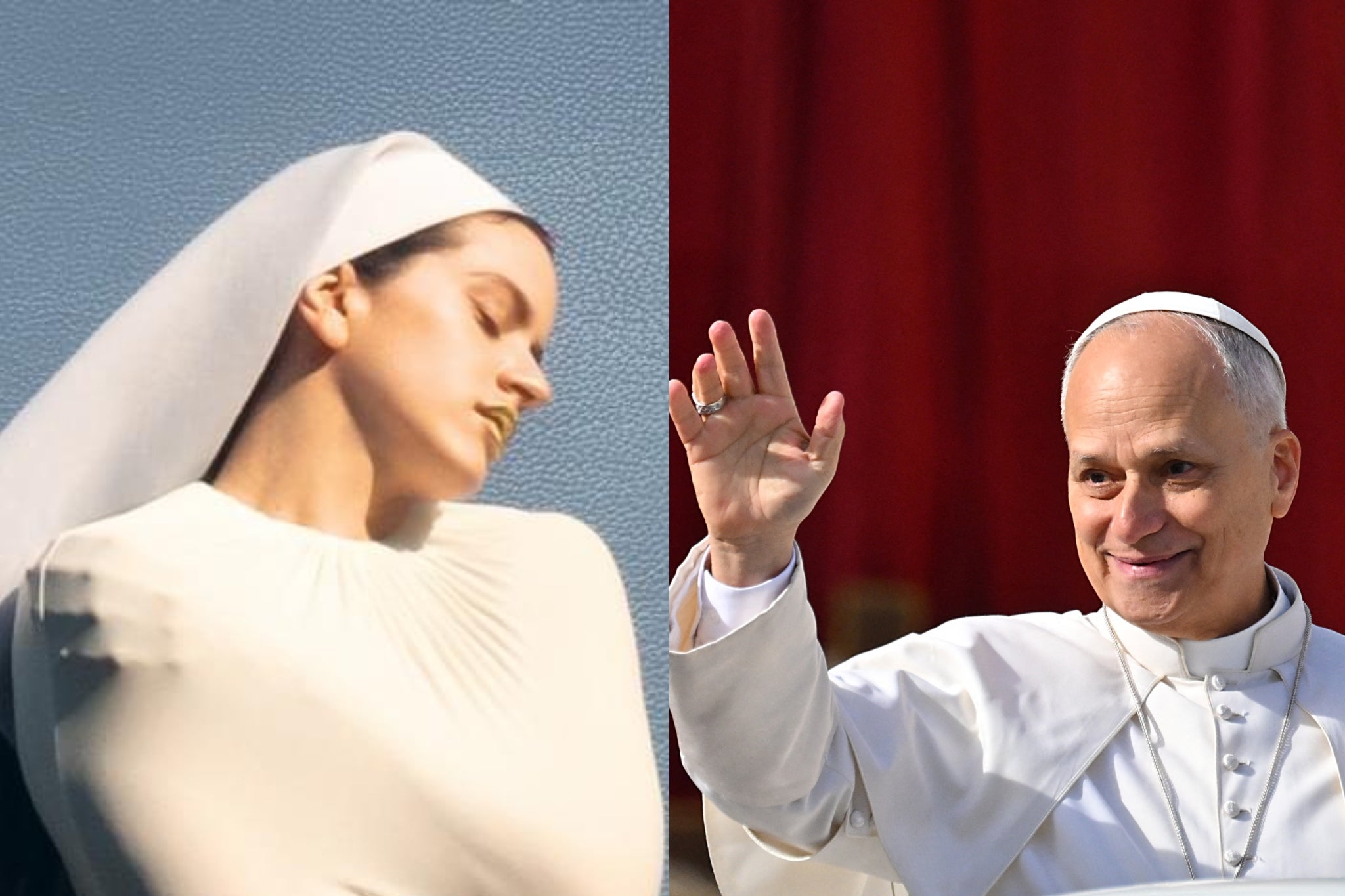- Culture
- Music
- Features
The pop star’s experimental, religious new album has found an unlikely fan in the Vatican, writes Fiona Sturges. Could this signal a new era of papal-pop culture diplomacy?
 Friday 28 November 2025 06:00 GMTComments
Friday 28 November 2025 06:00 GMTComments open image in galleryFaith will move mountains – and music charts, apparently (Columbia Records / Getty Images)
open image in galleryFaith will move mountains – and music charts, apparently (Columbia Records / Getty Images)
Get the inside track from Roisin O'Connor with our free weekly music newsletter Now Hear This
Get our free music newsletter Now Hear This
Get our free music newsletter Now Hear This
 Email*SIGN UP
Email*SIGN UPI would like to be emailed about offers, events and updates from The Independent. Read our Privacy notice
You could see it as divine intervention. When Rosalía, the Catalan pop sensation known for her bold, genre-hopping sound, released her fourth album, Lux, earlier this month, the reviews were ecstatic. “A masterpiece… possibly the best album of the year,” wrote The Independent’s Roisin O’Connor. “A truly compelling, involving experience … uniformly beautiful,” praised The Guardian.
These rapturous write-ups feel especially impressive when you consider this is not your run-of-the-mill pop record. Spread across four movements and sung in 13 languages, Lux is a concept album structured around the lives of female saints and mystics, including the German abbess Hildegard of Bingen and the Hebrew prophetess Miriam. It also features operatic vocals, massed choirs, fado singer Carminho, poetry from Patti Smith, plus thundering accompaniment from the London Symphony Orchestra. To call Lux esoteric would be an understatement, yet that hasn’t stopped it from landing in the Top 10 of the Billboard 200 chart, or from topping the Billboard Latin, Classical and World album charts.
More unusual still is that Lux serves as a showcase for its creator’s spiritual convictions. On the song “Divinize”, Rosalía compares her vertebrae to rosary beads, while in “Novia Robot”, she sings that she’s “guapa para Dio”, which roughly translates to “hot for God”. In case we were in any doubt of the album’s religious meaning, its cover has the singer in what looks a lot like a nun’s veil.
Now, extraordinarily, the Vatican has delivered its verdict on Lux. Though it stopped short of issuing a star rating, the feedback from the Holy See has been glowing. This week, Cardinal José Tolentino de Mendonça, the Vatican’s culture minister, stated: “When a creator like Rosalía speaks of spirituality, it means that she captures a profound need in contemporary culture to approach spirituality, to cultivate an inner life.” Meanwhile, Xabier Gómez Garcia, bishop of Sant Feliu de Llobregat, the diocese which includes Rosalía’s Spanish hometown of Sant Esteve Sesrovires, wrote that its creator “speaks with absolute freedom and without hang-ups about what she feels God to be, and the desire, the thirst [to know God]”.
A young pop star getting the thumbs-up from the Catholic church? It’s a far cry from the days when the Vatican was in the habit of condemning any artist or celebrity it suspected of having lax morals, or who didn’t treat Catholic beliefs or iconography with sufficient solemnity. Sure, Sabrina Carpenter did inadvertently cause the removal of a New York priest from his post after he granted her permission to film a music video in his Brooklyn church, but increasingly, such censure is rare. (The priest later admitted to a “lapse in judgement”).
Compare this with the late 1980s, for example, when Madonna felt the wrath of the pontiff after releasing “Like a Prayer”, the video of which saw the negligee-clad singer in a clinch with Jesus. The Queen of Pop incited the ire of the church a second time in 2006 when, on the Rome date of her Confessions tour, she staged a mock crucifixion. A Vatican spokesman called it “a blasphemous challenge to the faith and a profanation of the cross”.
All this was small beer next to the uproar caused by Elizabeth Taylor and Richard Burton, whose ostentatious antics while filming Cleopatra in Rome in 1963 – documented in lascivious detail across the world press – led the Vatican to release a statement accusing them of “erotic vagrancy”. (It’s worth noting that both actors were married at the time, but not to each other). The church was also irked by John Lennon’s pronouncement in 1966 that the Beatles were “bigger than Jesus”, although it revised its position in 2010 via the Vatican’s newspaper L’Osservatore Romano, in which it offered the Fab Four – or rather the two still living – absolution.
Over the years, pop culture has produced plenty more thorns in the side of the church, among them The Da Vinci Code, the Twilight series, Sinead O’Connor (who ripped up a picture of the Pope on Saturday Night Live) and The Last Temptation of Christ director Martin Scorsese. With the exception of O’Connor, who knew she was blowing up her career but did it anyway, all benefited from the backlash, earning column inches and a boost in sales in exchange for their sacrilege.
 open image in gallery‘I pray every night before I fall asleep. It’s a very personal relationship with God,’ Rosalía told an interviewer earlier this month (Press)
open image in gallery‘I pray every night before I fall asleep. It’s a very personal relationship with God,’ Rosalía told an interviewer earlier this month (Press)So could an endorsement from the Vatican, famously one of the world’s most conservative institutions, be the kiss of death for Rosalía’s career? Not a bit of it. This is partly because the singer has never shied away from talking about her faith (“I pray every night before I fall asleep. It’s a very personal relationship with God,” Rosalía told an interviewer earlier this month), but mostly because the Catholic church appears to have given up castigating artists and their work, and not before time.
Enjoy unlimited access to 100 million ad-free songs and podcasts with Amazon Music
Sign up now for a 30-day free trial. Terms apply.
Try for freeADVERTISEMENT. If you sign up to this service we will earn commission. This revenue helps to fund journalism across The Independent.
Enjoy unlimited access to 100 million ad-free songs and podcasts with Amazon Music
Sign up now for a 30-day free trial. Terms apply.
Try for freeADVERTISEMENT. If you sign up to this service we will earn commission. This revenue helps to fund journalism across The Independent.
At this point, the Holy See understands nothing good can come from appearing censorious or out of touch with the cultural zeitgeist. Not for nothing did Pope Leo XIV summon Hollywood stars, including Greta Gerwig, Spike Lee and Cate Blanchett, for a meet-up at the Vatican this month. In his speech, he hailed the role of film in helping us to “contemplate and understand life, to recount its greatness and fragility”.
Though there are still countries, the US among them, where the Christian right holds political sway and are prone to the odd Satanic panic, we nonetheless live in more secular times; for the most part, we are unfazed by the religious provocations of art and music. And in this secular age, there is something radical about a smart and talented young pop star exploring her faith through the medium of art and sharing her convictions without preaching or proselytising. In laying out her spiritual journey on Lux, Rosalía is not wagging a finger and telling us how we should think or be. She is simply telling us who she is.
More about
RosaliaVaticanCatholic ChurchJoin our commenting forum
Join thought-provoking conversations, follow other Independent readers and see their replies
Comments



